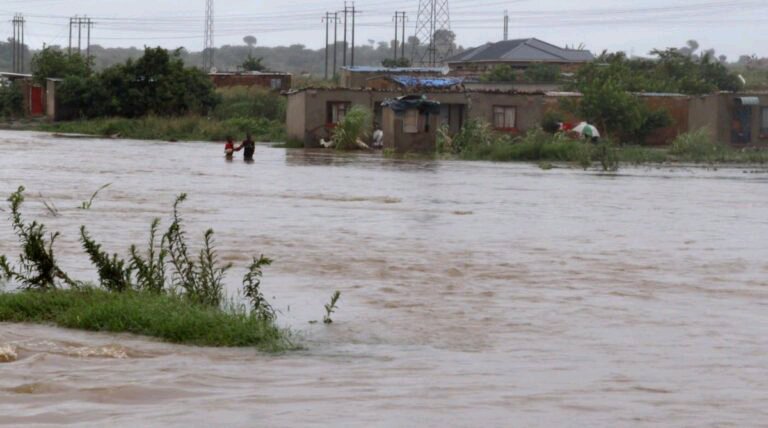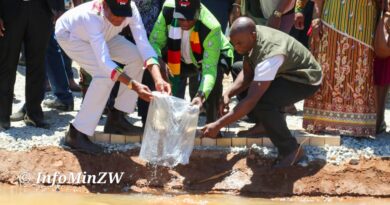BRIDGES DESTROYED, SCHOOLS HARD-HIT BY HEAVY RAINS
Heavy rains across most parts of the country have damaged critical infrastructure, including bridges, cutting off some rural communities and forcing residents to walk long distances to access transport and other essential services.
In response, the Government has begun assessing the extent of the damage, while the Zimbabwe Parks and Wildlife Management Authority has warned that some water bodies may now harbour swept-away crocodiles.
In addition to bridges, the heavy rains have destroyed public infrastructure such as schools and other social amenities. The condition of the country’s roads has also deteriorated since the rainy season began.
Rain-related incidents have resulted in the deaths of over 50 individuals countrywide. The Civil Protection Unit (CPU) and other emergency rescue services are urging the public to avoid crossing flooded rivers.
Mr Christopher Shumba, the director-general of the Rural Infrastructural Development Agency (RIDA), stated that the rains have damaged infrastructure in many parts of the country, leaving some communities isolated.
He added that the agency is currently assessing the extent of the damage to aid Government planning.
“The rains have caused extensive damage to infrastructure although I don’t have the exact statistics of the damaged areas off hand. We have reports of damages in provinces such as Matabeleland South, Midlands, Masvingo, Manicaland and Mashonaland Central,” he said.
“We are not experiencing flash flooding but due to excessive rains, the impact is gradually excessive.
“We are in the process of conducting follow-ups to assess the impact in communities. We know that there are communities that have been cut off. So, we are compiling data so that we can respond to those areas.”
Authorities have discouraged motorists from crossing flooded rivers after videos of public service vehicles risking passengers’ lives have gone viral.
Nkayi District Development Coordinator, who also chairs the area’s CPU, Ms Matilda Mlotshwa, said two dams in the area burst their walls on Saturday.
“We are assessing the damage but the situation is bad. Some roads have been cut off. The road leading to Sikhobokhobo area from Nkayi Centre has been cut off while some crops were washed away after Sombengo Dam in Ward Nine and Fako in Ward 26 in Somthanyelo Village burst,” said Ms Mlotshwa.
She said communities are now forced to walk up to 30km to catch buses as the roads have become impassable.
Matobo district development coordinator, Mr Obey Chaputsira, said rains have extensively damaged the Bulawayo-Maphisa Road and feeder roads to Maphisa from local business areas.
He, however, said the district has been fortunate that no bridge has been washed away. In some places, some bus operators plying rural routes have been recorded driving through flooded rivers, which raised concerns over public safety.
Two buses were recorded crossing a flooded Whovi River in Matobo District with one almost plunging into the river. This has attracted criticism from commuters.
Bulawayo Bus Operators Association chairman Mr Patrick Dube, who owns Green Horse buses, has bemoaned the calibre of drivers that are getting licenses describing some of them as irresponsible.
He said as owners they are concerned with the safety of the public.
“When we employ them, we also reaffirm that they should not cross flooded rivers. But when they are out on the job they do as they please.
“Some of them have been fired for crossing flooded rivers. But the unfortunate thing is that even after losing their jobs they will go to another company and be employed
“We receive drivers who are tested for their competence by the Vehicle Inspection Department. They also undergo defensive driving tests before being allowed to drive public service vehicles,” he said.
“One of the things that they are taught in defensive driving and part of that training is that they should not cross flooded rivers.
“Even the Traffic Safety Council of Zimbabwe also teaches them that. But when they get on the roads they do what is against the law.”
Mr Dube appealed to road authorities to urgently fix the country’s roads as most of them have become untraffickable.
He said bus crews are now travelling almost double the time they should due to the state of the roads.
The Zimbabwe National Water Authority (Zinwa) has said due to rains, some of the country’s dams are now spilling and warned of downstream flooding.
Following the spilling of water bodies and flooding of rivers, authorities have urged members of the public to be on high alert as crocodile attacks become highly possible as the reptiles can be swept away to new water bodies.
In 2023, an unsuspecting 53-year-old old woman survived a crocodile in Kana River, Lupane, in an area never known to harbour the dangerous reptiles.
Zimparks spokesperson, Mr Tinashe Farawo, said members of the public must always be on high alert whenever there are flash floods in their areas.
“We are saying all water bodies must henceforth be treated with high suspicion. The authority has of late been receiving reports of crocodile attacks right across the country and these reports have been on the increase this time around due to increased rainfall activity,” said Mr Farawo.
Over the past two months, ZimParks has recorded over 20 cases of crocodile attacks, resulting in eight fatalities and three serious injuries.
Crocodiles are known to pose significant risks to livestock, and recently ZimParks emphasized the need for caution and advised farmers to avoid leaving livestock unattended near rivers and lakes, as this can attract crocodiles and lead to devastating losses. *_-Chronicle_*




